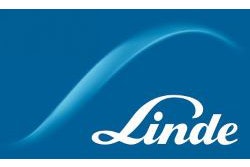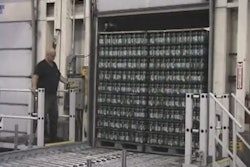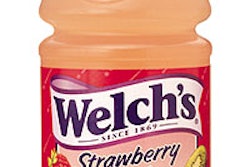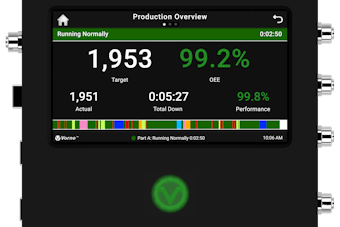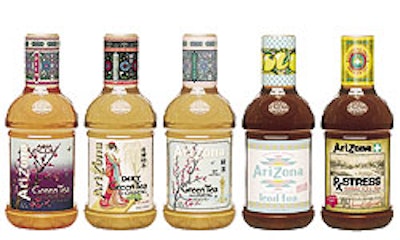
Innovative uses of polyethylene terephthalate continue to shine in the packaging spotlight. That’s especially so in the beverage and dairy markets, where prominent manufacturers including Perrier Vittel SA and Ferolito Vultaggio & Sons (creators of AriZona Beverages) introduced beverages in noteworthy PET bottles earlier this year. Moving into PET was significant for Lake Success, NY-based Ferolito Vultaggio & Sons. In July, the company began using PET for five 42-oz “new-age” AriZona Beverage-brand drinks (1). Until now, the company’s offerings have been recognized for their custom glass bottles decorated with colorful, vibrant sleeve labels. The new hot-filled PET bottles are additions to the glass containers. The heat-set PET bottles retail nationwide for $1.99. Shelf life is nine months. “Development of a longneck, heat-set PET bottle has been part of our plan for the brand for some time,” says Don Vultaggio, FV chairman. “Making it happen was a huge undertaking for our company, and we appreciate all the hard work from our supplier, Constar.” Constar (Philadelphia, PA) is a subsidiary of Crown Cork & Seal. The custom bottle includes an approximately 3”-long neck that creates differentiation for the products. “Prior to now, hot-filled PET used basic designs that served the function of containing the product,” says John Balboni, FV’s president and chief business development officer. “But we wanted to make the plastic bottle look just like our classic, proprietary glass bottle design,” he tells Packaging World. While the bottle retains a shape similar to that of its single-serve glass counterparts, it also offers hand grips that allow a consumer to grip the bottle and easily pour out its contents. “One of the things we found out through our research was that people were dissatisfied with the standard two-liter soda bottle because once you open it and release the pressure, it’s very difficult to hold and pour without using two hands,” Balboni contends. The bottle also incorporates a lug at the bottom that helps in orientation on the filling line, allowing precise front-and-back-panel label application. The five flavors in the PET line, including new RxStress Tea, are contract-packaged by Northland Cranberries (Wisconsin Rapids, WI) at a plant in Dundee, N.Y. New equipment and change parts were necessary for the job. Fill temperatures range between 185° F and 190° F. In the near future, the company is expected to transition from monolayer PET to Constar’s patented StarShield® system. It will include a multilayer oxygen-scavenging bottle construction that incorporates the vendor’s Oxbar™ scavenger. “We currently have a nine-month shelf life, and we want to get to one year,” says Balboni regarding the enhancement. “We do not use preservatives or artificial colors or flavors, and we want to build as much shelf life into the package as we possibly can to ensure the highest quality.” Balboni says there’s no question “going to PET is big for us. But we’re trying to bring innovation to the plastics side, just like we’ve done with glass. We’ve been working for years on this project to get it right, and we feel that we’ve developed a PET bottle that’s consistent with our other packaging and imagery.” He admits that this 66-g bottle is a heavier weight than would traditionally be used for a 42-oz beverage and is therefore more expensive. “We justify that expense from the standpoint that we’re delivering a premium product and package for the consumer.”
Carbonated dairy beverages Perhaps the most unusual PET application covered in this report is for an 8-oz carbonated dairy-based beverage called e-MOO (2). Marketed by MAC Farms, Burlington, MA, e-MOO is made from powdered or fluid milk (depending on price and availability), flavorings, and nutrients. After high-temperature short-time (HTST) pasteurization, carbon dioxide is bubbled at a constant rate into the liquid via a sparger supplied by Praxair (Danbury, CT). That occurs just upstream of filling. MAC Farms develops, manufactures, and markets e-MOO but has the beverage contract-packaged by Queensboro Farm Products (Jamaica, NY). For this application, Queensboro added a new 12-valve rotary filler from Federal Manufacturing (Milwaukee, WI) and a labeler made by Quadrel Labeling Systems (Mentor, OH). Bottles are supplied by Schmalbach-Lubeca (Manchester, MI). “Schmalbach worked very closely with us during this whole process to develop a bottle that retains the carbonation, yet allows us to keep our costs down,” says George Clark, MAC Farms’ vice president of operations. Clark, a biochemist, helped start MAC Farms about five years ago, along with his wife, Mary Ann, a registered nurse. Carbonation helps extend the beverage’s shelf life. “The carbonation lowers the pH of the dairy product to an acidity level of about 5.9, which [inhibits] bacterial growth,” explains Clark. The addition of CO2, coupled with a patent-pending process that Clark cannot yet discuss, helps e-MOO achieve a 60-day refrigerated shelf life. MAC Farms worked with Cornell University to develop the carbonation process used for e-MOO and to create products for specific consumer groups. The ribbed bottle is easily gripped by children, and the nonfat beverage provides the same nutritional benefits as skim milk, Clark contends. “But in addition to adding nutrients and extending the shelf life, we wanted to position this beverage as fun and exciting. For years, dairy products had been considered one of the essential food groups, but not a beverage. Sales of milk were moderate to flat, compared with other beverages that were showing more sizable growth. “About three or four years ago,” he continues, “the dairy industry began to make moves to get out of its doldrums and increase sales. And while some companies came out with very attractive and unique packages that created market interest, they did not add functionality or better taste or extend the shelf life of the milks.” Based on the success of a mid-June test market in four Tops Markets stores in New York “that far exceeded our sales goals,” says Clark, that retailer contacted MAC Farms to produce e-MOO for a broader market. E-MOO recently expanded into 126 stores located in New York, Pennsylvania, and Ohio. “And in October, we’ll be introducing the beverage into Walgreens in four eastern states. We expect to be in Walgreens stores nationwide at some point next year.” The 8-oz e-MOO is currently sold in two flavors, though MAC Farms has formulations for 11 varieties. Suggested retail price is 69¢. Clark says the small “e” in e-MOO refers to the electronic “E”. “We noticed more youngsters are learning about computers and sending e-mails instead of writing notes, so we figured the ‘e’ would bring milk into the electronic age.” By next summer, MAC Farms expects to have three more carbonated beverages on the market. Clark says these products will be sold in 10- or 12-oz PET bottles, also from Schmalbach-Lubeca.






